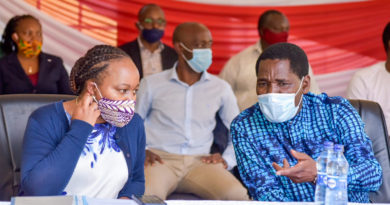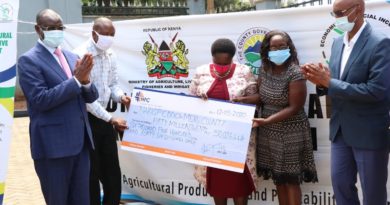KALRO Climate smart Agriculture Technologies for Pasture and Fodder Value Chain
Press Release
Scientists in Kenya Agricultural and Livestock Research Organization have developed ten (10) pasture and fodder Technologies, Innovations and Management Practices (TIMPs) to support production of beef, sheep, goat and camel in Kenya rangelands to mitigate effects of climate change.
These TIMPS include natural pasture improvement through reseeding, kiboko range pits for water harvesting for pasture production, community based range grass seed bulking and management practices, acacia tortilis seedpod supplement for finishing weaner goats and sheep, prosopis juliflora seedpod flour for finishing goats, cotton seedcake as supplementary feed for beef cattle finishing. Others include, cost effective feed conservation structure, socio economics of reseeding rangelands in Kenya, matching livestock production with the market needs and estimating carbon sequestration in rangelands.
Through trainings such as the one currently being undertaken in Meru, KALRO scientists will train 200 trainers of trainers who are extension service providers drawn from Kajiado, Tana River, Mandera, Taita Taveta, Isiolo, Marsabit, Laikipia and West Pokot counties. So far, 120 trainers have already been trained and the 40 currently being trained in Meru brings the total number trained this far to 160. The trained trainers are expected to train farmers who are members of Common Interest Groups (CIGs) in their respective counties. Adoption and use of the TIMPs by the CIGswill help KCSAP realize the triple wins of increasing productivity, building resilience of communities and, reducing greenhouse gas emission.
Development of pasture and fodder TIMPs is part of activities under Kenya Climate Smart Agriculture Project (KSCAP), funded by the World Bank. KALRO is expected provide, promote and facilitate adoption of the TIMPs in order to achieve the KCSAP triple-wins.
The direct beneficiaries of KSCAP are estimated at about 521,500 households of smallholder farmers, agro-pastoralists, and pastoralists. Approximately 163,350 households organized in about 4,950 Common Interest Groups (CIGs) and 18,150 households in 1,100 Vulnerable and Marginalized Groups (VMGs).
The trainings of trainers are expected to translate to increased productivity of livestock resulting from enhanced feed quantity and quality to be driven by establishment of new pasture fields and rehabilitation of degraded rangelands. Counties may also venture into commercial production of grass hay, range pasture and fodder seeds. KALRO also hopes that the trainings will increase climate adaptation and mitigation activities among the rangeland communities.
Pasture and fodder production in Kenya is constrained by factors including:
- Inadequate availability of quality and quantity seeds that is made worse by lack of formal registration of pasture and fodder seeds by KEPHIS. In this regard, KALRO Kiboko has entered 5 range pasture grasses in the National Performance trials in a bid to address this challenge;
- Communal land ownership in ASAL areas which frustrates both establishment of new pasture fields and rehabilitation of degraded areas through reseeding.
- Breakdown of traditional/customary institutions which governed grazing management and through which newly planted pasture fields and reseeded degraded areas would be protected to facilitate full establishment. The institutions would need to be revived and strengthened;
- Lack of organized marketing for both seed and hay such that those wanting to buy not know where to find and those wanting to sell not knowing where the buyers are. Interventions aimed at streamlining marketing are required;
- Inadequate or occasionally too much rainfall in ASALs which leads to poor performance and destruction of established or rehabilitated pastures, respectively.
Eliud Kireger PhD. OGW
DIRECTOR GENERAL- KALRO


